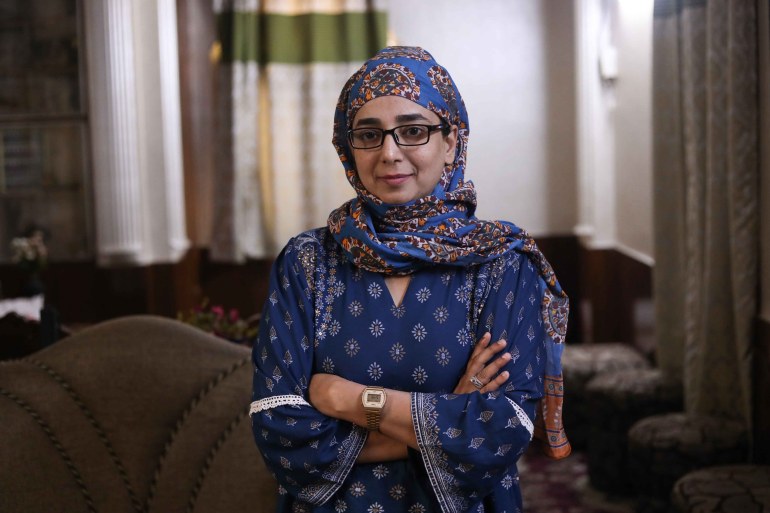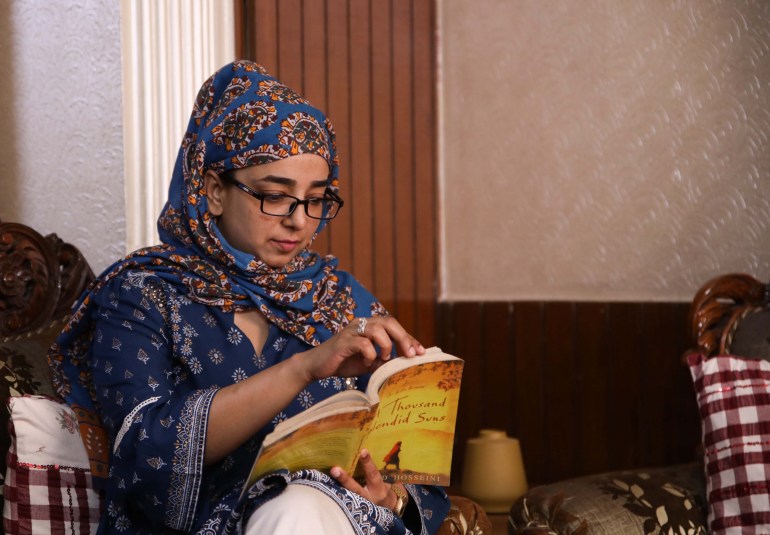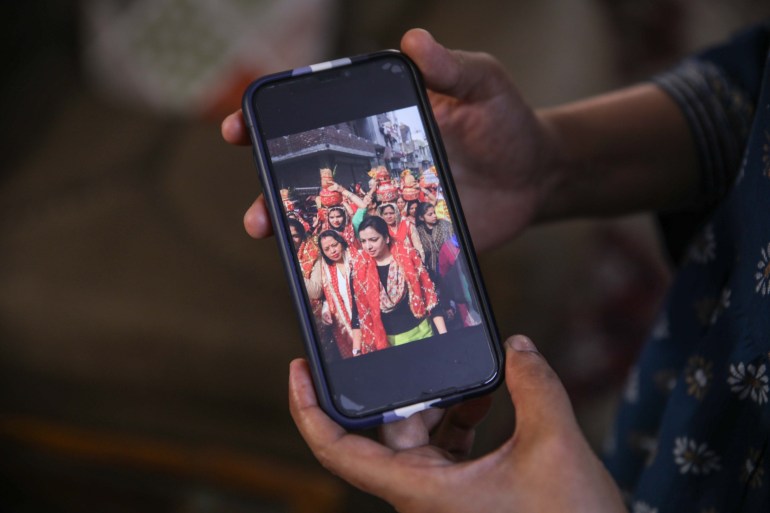India: Muslim activist recounts two ‘painful’ years in jail
Ishrat Jahan was arrested throughout the 2020 Delhi riots following protests towards a controversial citizenship regulation handed by Modi’s authorities.

New Delhi, India – When Ishrat Jahan walked out of a jail within the Indian capital final week, she was hugged by her sister they usually burst into tears as relations gathered round to welcome her again house after greater than two years of imprisonment.
“I missed my household quite a bit. This separation was very tough for me,” she informed Al Jazeera per week after her launch from jail.
Jahan, a 31-year-old activist, was arrested together with dozens of different Muslims in February 2020 throughout mass protests towards a controversial citizenship regulation handed by Prime Minister Narendra Modi’s Hindu nationalist authorities in December 2019.
The Citizenship Modification Act (CAA) allowed non-Muslim migrants and refugees from India’s neighbouring international locations to safe Indian citizenship in the event that they arrived in India earlier than December 2014. Learn along with a proposed Nationwide Register of Residents (NRC), many feared the CAA-NRC plans have been geared toward disenfranchising the Muslim minority.
Critics mentioned the CAA violated India’s secular structure whereas United Nations’ consultants referred to as the regulation “essentially discriminatory”.
The passage of the CAA and fears over a possible NRC triggered a wave of peaceable demonstrations throughout India, with Muslim ladies main the sit-ins at numerous locations, together with at Shaheen Bagh, a working-class Muslim-dominated neighbourhood in southeast Delhi, which changed into the epicentre of the protests.
Jahan, a lawyer and former municipal councillor elected from her locality, organised one such female-led protest in East Delhi’s Khureji space.

Irked by the protests, some leaders and ministers belonging to Modi’s right-wing Bharatiya Janata Occasion (BJP) inspired their supporters to suppress the sit-ins and even “shoot” the protesters.
The hate speeches led to an outbreak of non secular riots in japanese components of Delhi within the final week of February in 2020, killing greater than 50 folks, most of them Muslims, whereas dozens of homes and mosques have been torched.
The police, accused by victims and witnesses of colluding with Hindu mobs throughout the violence, made a sequence of arrests of anti-CAA activists, charging them below a stringent “terror” regulation, referred to as the Illegal Actions Prevention Act (UAPA).
Most of these arrested below the UAPA and different legal guidelines proceed to languish behind bars whereas authorized instances and investigations proceed at a snail’s tempo.
Jahan was arrested on February 26, 2020, two days after the Delhi riots erupted, with police first charging her with rioting and illegal meeting and later accusing her of being a part of an alleged conspiracy to foment spiritual riots within the capital.

Recalling the day the police arrested her from Khureji’s anti-CAA protest website, Jahan mentioned she obtained an “ominous name” that morning.
“The caller informed me some protesters have been backing off from the positioning,” she mentioned.
However the second she reached the placement, there was nobody there besides a big posse of police. She mentioned she discovered herself “alone and speechless” as cops swooped in on her and whisked her away in a automobile.
“I couldn't perceive why I used to be being detained,” Jahan mentioned.
On March 14 final week, in a uncommon occasion, a trial court docket in Delhi granted bail to Jahan regardless of her dealing with expenses below the UAPA, which bans bail for an accused if the police can set up a prima facie case.
Jahan’s lawyer Pradeep Teotia argued earlier than the court docket that police had falsely implicated her with no proof to hyperlink her with the Delhi riots.
The court docket upheld the view, noting that the position of Jahan “who's a girl … persuades this court docket to permit the current utility for bail regardless of the embargoes” in UAPA and different legal guidelines.

Jahan mentioned she has not come to phrases with why she was held in a high-security jail for greater than two years. She asserted she was “wrongly framed” as she dismissed the costs of conspiracy, saying the anti-CAA motion stood for democracy, secularism and constitutional equality.
“Our protests had no hyperlink with violence in anyway,” she mentioned. “It was additionally an enormous instance of girls’s empowerment.”
Jahan mentioned she was offended by police branding her “a terrorist” and alleged she was subjected to “psychological torture” throughout the interrogations.
“They (police) created a bogus image and tried to suit me in it. They tried to hyperlink me with some folks. They confirmed me pictures of various folks and tried onerous to get a confession from me,” she mentioned.
“My dad and mom have taught me to consider within the structure. I've studied regulation. It had by no means occurred to me that a girl who believed in secularism could be charged with terrorism.”

Jahan mentioned she was handled in another way within the jail from the remainder of the inmates. “I used to be put below excessive surveillance. In contrast to different inmates, I used to be given no work to kill time. Inside jail, a minute appears like a day.”
She mentioned the primary six months of the coronavirus pandemic have been essentially the most tough for her within the jail as the federal government had imposed a national lockdown to curb the unfold of the virus.
“There have been no bodily or digital conferences because of the lockdown. I didn't see the face of anybody in my household for months. I used to be saved in two-week isolation inside a cell a minimum of seven occasions. These six months have been actually painful,” she mentioned.
“I obtained to know what actual starvation appears like. I understood the ache of separation out of your family members,” she mentioned, citing a poem by well-known 18th century Urdu poet, Mirza Ghalib.
“Ishrat-e-qatra hai dariyā meñ fanā ho jaanā / dard kā had se guzarnā hai davā ho jaanā” (To be consumed by oceans is the droplet’s ecstasy / When ache exceeds all bounds, turns into itself the treatment)
Jahan mentioned she was equally apprehensive about her household who have been additionally questioned and harassed when she was in jail. “However they by no means left me by myself,” she mentioned.
“Throughout lockdown, they put their well being in danger for me. Everybody in my household obtained contaminated with coronavirus. When everybody was confined to their houses, my sister got here out and ran from pillar to publish in her wrestle for justice.”
Jahan’s sister Sarwer can be a lawyer. “It's really a battle we have now gained legally,” Sarwer mentioned.
In June 2020, Jahan was granted 10 days’ bail to get married. “It was an unbelievable second for me to be allowed to go house and marry. I'm grateful to the judiciary for trusting me.”
On the sixth day of her marriage, she returned to the jail. “We have been all in tears. Marriage means you consider a brand new household, new life, new folks and also you get to take a seat amongst them and discuss to them. However I couldn't get pleasure from that privilege,” she mentioned.
Jahan’s husband, Farhan Hashmi, informed Al Jazeera he doesn't need anybody to undergo what his spouse has suffered. “Her arms have been coated in mehndi (henna) after I mentioned goodbye to her on the jail gate. It was a painful second.”
Within the jail, Jahan mentioned she noticed the various issues prisoners confronted and careworn the necessity for jail reforms.
“Inmates, significantly ladies, wouldn't have entry to attorneys. Household conferences are uncommon. For a five-minute name, they've to attend for months. Most individuals haven't any garments or cash,” she mentioned.
Jahan mentioned she is anxious in regards to the security of her co-accused, who're nonetheless in jail.
“I pray that they keep protected. A few of the households are dealing with monetary crises. They want our help. I've full religion that they are going to be out sooner or later.”
Đăng nhận xét for "India: Muslim activist recounts two ‘painful’ years in jail"